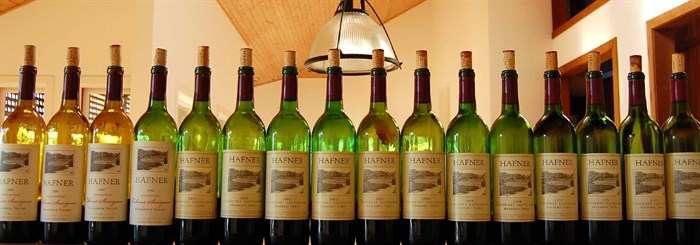Wine Aging 101
- May 27, 2015
One of the greatest rewards for me in winemaking is tasting an older vintage that is drinking wonderfully. Aging wine can be intimidating, so we thought we’d provide our experience and perspective. Here is a “Wine Aging 101” to focus on our Alexander Valley Cabernet...so grab your pencil and a glass of Cabernet. We hope you enjoy this Q&A and we encourage you to send us any questions you might have. We always enjoy hearing from you about older vintages that you've tasted. Cheers!

What’s the style of Hafner Cabernets?
Our philosophy for making Cabernet Sauvignon is inspired by the wines of Bordeaux, known for their balance, elegance and ageability. Alexander Valley has a longstanding tradition of Cabernet, thanks to our climate – warm days and cool nights. Since 1982, our focus has been on elegance and finesse, not on richness, power and ripeness. Our goal is to make wines that age well and complement food.
Why does our Cabernet age so well?
We tend to pick our grapes earlier than most California wineries, which leads to a wine with lower alcohol and higher acidity. (The higher acid helps to protect the wine and preserve its flavors.) This lends itself to greater longevity and compatibility with food.
Why do we release the Cabernet in its fifth year?
After 22 months in oak barrels and another 30 months in bottle, we feel that the Cabernet has had time to develop and is enjoyable. At this point, the bouquet is fruit-dominated, often with notes of blackberries, cassis and cherries, and hints of dark chocolate, sweet vanilla and mint, though it is often still very young.
How does Cabernet change as it ages?
As our Cabernet ages, the complexities come to the forefront and its fruitiness dissipates. We feel that our wines, especially the Cabernet, improve with age because of the structure they have – lower alcohol and higher acidity. As they develop, more interesting characteristics come through – notes of violets, cigar box, briars and carpaccio. They are silky, velvety, supple in the mouth, less fruity and less tannic.
At what point are Hafner Cabernets hitting their stride?
We feel confident in telling people that they can enjoy our red wines for at least 15 years from the vintage date on the bottle. With the caveat being that everyone’s tastes are different. If you like your wines younger and fruitier, drink them earlier. If you prefer them more developed and softer, hold on to them. For me, it depends on what I am eating – if we are enjoying a steak or lamb, we drink a younger, fuller Cabernet whereas with pizza or cheese and bread, we open an older bottle.
How should I store Cabernet that I want to age?
The most important aspect to storing wine is that it is kept at a constant temperature, no drastic changes. The ideal temperature is between 58 and 65 degrees Fahrenheit. Bottles should always be stored on their side or with the necks down so that the cork remains in contact with the wine and stays moist.
When you purchase wine from us, it comes directly from the winery where it has been stored properly. This is not necessarily so when you buy wine from a wine shop where you don’t know its previous storage conditions. Often, bottles are displayed by standing up on the shelves and under bright lights.
How should I serve an older Cabernet?
We suggest you serve Cabernet at 65 degrees Fahrenheit (or somewhere near there). For an older Cabernet, we do not suggest decanting it. You decant a wine to give it oxygen and time to develop; with an older wine (10+ years for Hafner Cabernet), it does not need additional oxygen.
When you open a bottle, the cork may be fragile. (If the wine is older than 15 years, we suggest using an “Ah So” wine opener.) Pour the wine slowly as to not pick up too much oxygen. Once you are near the end of the bottle, there will be some solids (mainly color pigments) that have dropped out of the wine over time. This is normal. (Notice that an older Cabernet is a lighter hue than a young Cabernet.)
Older red wines do not hold up in partial bottles as well as younger wines do, so if I know we will only drink half a bottle, I may choose a younger wine (5-10 years old).
How can I learn more!?
We always hold back a bit of each wine to re-release later and share with patrons to demonstrate the benefits of age (and make for an impressive dinner wine or gift!).
What questions do you have about aging?
Send us an email or call us (707-433-4606). I will answer them in our next “Wine Aging” class.
Thanks for reading, now…class dismissed!



